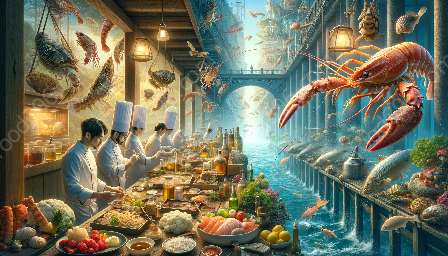Seafood is an essential component of many professional kitchens, offering a wide array of flavors, textures, and culinary possibilities. In this exploration of seafood in professional kitchens, we will delve into the culinary and gastronomy studies, as well as the science behind seafood, to understand its unique place in the gastronomic world.
Culinary and Gastronomy Studies
In the realm of culinary arts, seafood holds a revered position due to its versatility and exquisite taste. Professional chefs study the nuances of seafood, learning about different types of fish, shellfish, and crustaceans, as well as the best techniques for preparing these delicate ingredients. From filleting and shucking to curing and grilling, seafood requires a specialized skill set that is honed through rigorous training and hands-on experience.
Moreover, gastronomy studies delve into the cultural and sensory aspects of seafood consumption. Professionals in this field explore the historical, social, and geographical influences on seafood cuisine, uncovering the rich tapestry of flavors and traditions that have evolved over centuries. By understanding the cultural significance of seafood, chefs can create authentic and meaningful culinary experiences for their patrons.
Seafood Science
Behind the scenes, seafood science plays a critical role in ensuring the quality, safety, and sustainability of seafood in professional kitchens. Scientists and researchers focus on various aspects, such as the composition of fish and shellfish, preservation methods, and seafood-related foodborne illnesses. This knowledge is essential for chefs and kitchen staff, as it informs their decisions regarding sourcing, handling, and storing seafood to maintain its freshness and integrity.
Additionally, sustainable seafood practices are at the forefront of seafood science. With concerns about overfishing and environmental impact, professionals in the seafood industry are dedicated to promoting responsible sourcing and consumption of seafood. By understanding the ecological implications of seafood production, chefs can make informed choices that support marine biodiversity and conservation.
Flavors and Cooking Techniques
Seafood offers a vast spectrum of flavors, from delicate and briny to rich and buttery, allowing chefs to create diverse and exquisite dishes. Whether it's the firm texture of grilled swordfish, the umami depth of miso-glazed black cod, or the sweet succulence of lobster tail, seafood presents endless opportunities for culinary creativity and innovation.
Cooking techniques for seafood are equally diverse, encompassing methods such as poaching, steaming, broiling, and frying. Each technique accentuates the natural qualities of different seafood varieties, enhancing their flavors and textures. Understanding the appropriate cooking methods for specific types of seafood is paramount in achieving the perfect balance of succulence and tenderness.
Sustainability and Ethical Sourcing
As the demand for seafood continues to rise, ethical sourcing and sustainability have become integral considerations in professional kitchens. Chefs are increasingly mindful of their seafood sourcing practices, seeking out suppliers who adhere to sustainable fishing and aquaculture standards. By prioritizing responsibly sourced seafood, chefs contribute to the preservation of marine ecosystems and support the livelihoods of small-scale fishermen.
Furthermore, educating both kitchen staff and diners about sustainable seafood practices fosters a culture of environmental consciousness within the culinary world. By championing sustainable seafood, professional kitchens can make a positive impact on the health of our oceans and the future of seafood consumption.
Conclusion
Seafood in professional kitchens encapsulates a rich tapestry of culinary artistry, scientific rigor, and ethical responsibility. Through the marriage of culinary and gastronomy studies with seafood science, chefs and industry professionals continue to push the boundaries of creativity while upholding the principles of sustainability and ethical sourcing. The world of seafood in professional kitchens is brimming with diverse flavors, cooking techniques, and traditions, inviting us to embark on an ever-evolving gastronomic journey through the bounties of the sea.

